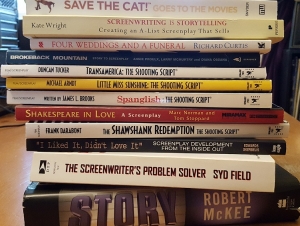A few weeks ago, I saw Boy George and Culture Club in concert on a reunion tour. It was fantastic. His voice was still powerful, and he had that familiar, sassy humor that doesn’t give a crap what percentage of the audience is straight or gay. I realized the last time I saw him was 33 years ago when I was 13. For anything to be 33 years ago is very daunting. At the recent concert, scanning a crowd that was my age or older, my life flashed in front of me like a Centrum Silver commercial.
But this flash of memories, and that full-circle feeling, are the reasons why I’m especially proud of one of the choices I’d made in my latest book, Southern Girl—to include Boy George in the narrative, making an impact on the main character. Southern Girl not only makes reference to him, but he represents some of the most important themes of the story. Now you may ask, how does Boy George figure so prominently into a story about growing up in the South?
Let me take y ou back to 1983. The state of Tennessee is not the first place that would spring to mind when you imagine who would be most likely to welcome a gay drag queen. Yet in 1983, at the peak of Culture Club’s popularity, I went with my mother and sister to see my first concert, which happened to be Boy George and Culture Club, at the largest auditorium in Nashville.
ou back to 1983. The state of Tennessee is not the first place that would spring to mind when you imagine who would be most likely to welcome a gay drag queen. Yet in 1983, at the peak of Culture Club’s popularity, I went with my mother and sister to see my first concert, which happened to be Boy George and Culture Club, at the largest auditorium in Nashville.
The next day, The Tennessean newspaper reported that the shrieking at the concert was reminiscent of Beatlemania. People were grabbing at Boy George like he was Elvis. But if a man walked down the street in any small town in Tennessee dressed in the same Boy George hat with makeup, he’d either be beaten to a pulp, or at the very least, stared at, and not in a good way.
That’s when I realized, you get a certain amount of slack if you’re a celebrity. I mean, who else but Lady Gaga could show up at a public event dressed in meat, and it’s called a fashion statement, not a desperate cry for help?
At age 13, I identified with Boy George. Maybe I didn’t fully understand why, except that he was rejecting gender stereotypes when he dressed and looked a certain way. And I hated to wear super girly clothes. It had gotten to the point where I dreaded Sundays (dressing for church) because that’s when my differentness was in the spotlight. Why didn’t I want to wear skirts and pantyhose and heels? Why did I tear them off as soon as I got home like I was ridding myself of flesh-eating bacteria? I sometimes wondered if something wasn’t wrong with me.
Enter Boy George, whose voice was amazing on the radio. Then, thanks to MTV, I was able to see the person who went with that voice. A man who was as pretty as a woman. To say there was nothing like him in my small Tennessee town is an under-understatement. Then came the night I saw him on The Barbara Walters Special. I taped the interview on our old-fashioned, gigantic VHS to have for posterity. Of course, Walters challenged him with questions about Jerry Falwell, and how he’d said a man who doesn’t want to be like a man is against what God created. Boy George responded with, “The God I believe in doesn’t discriminate.” He also said things like, if being a man meant acting macho and hitting things, then he didn’t want to be that. Nor did he want to be a stereotypical woman. In fact, he was one of the first pop icons to publicly say he didn’t agree with gender stereotypes. Seems like no big deal today, but people like Boy George paved the way for our relaxed attitudes now.
It’s no surprise that I immediately felt a connection to him. He’d given voice to things I’d felt, things I believed were backwards about society, and he did so with such calm assurance. I watched the interview thinking that everything was going to be all right.
That’s why in my latest novel, Southern Girl, Boy George plays an important role in the protagonist’s life. The story is set as Jess is growing up in the 1980s. And Boy George is popular during this time, even among conservative kids who wouldn’t dare present themselves as anything but stereotypical boys and girls. Jess is pressured by the rules of society that George clearly doesn’t seem to follow, and this impresses her. Even better, her minister father thinks Boy George is attractive until he realizes George is a man. Jess gets a perverse thrill when she tells her dad the truth about that attractive “woman” on TV.
There’s a pivotal scene in Jess’s bedroom when her crush, Stephanie, challenges the beliefs of a preacher’s daughter—and Jess is open to new ideas because she’s open-minded enough to have a Boy George poster on her wall:
“What does your dad think of him?” Stephanie asked, gesturing to a picture of the singer.
“He’s not crazy about him,” Jess admitted. “But he’s like, ‘It’s better than drugs.’ So. . .”
Spending an evening with George as he is now, joking about all of our bad hair back in the ‘80s, gave me a warm feeling, and a sharp awareness about the power of time. Cue the song. . . Time has a way of healing, changing and empowering the girl from 1983 who felt different, who had a desperate crush on a female classmate. But the Barbara Walters interview is the only thing I’ll admit in common with Jess. Those who know me know that I’m too short to play basketball.
Time reminds me why Boy George WAS so important to this Tennessee girl—not only for his music, but for the insight and courage he showed just by being a man who wore makeup because he wanted to, who did unmanly-looking things, like dancing around a pool in a video, wearing what could have been his pajamas. The point is, the existence of Boy George started a fire inside me, that I could be whomever I wanted to be. This confidence carried into my adulthood. That’s why he’s an important character in the Southern Girl story—an icon of pop culture who shows the protagonist there IS another way.
With so many LGBT and questioning teens feeling helpless and hopeless in their small towns, I hope they’ll find someone they can identify with as I did, who proves you can have a happy life. That’s why I want to say thank you, Boy George, from my main character and from me.




